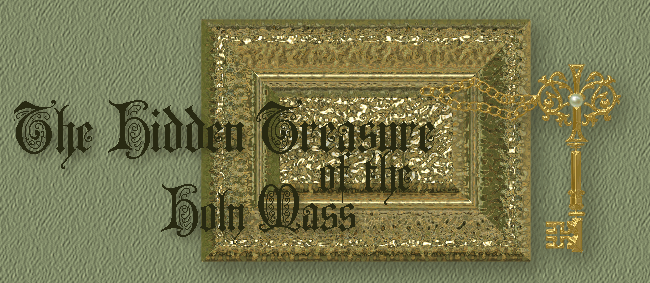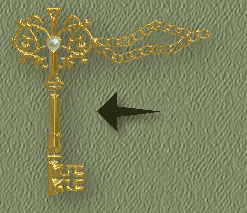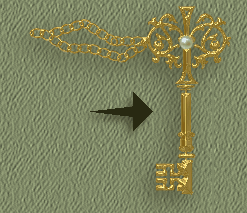

by St. Leonard-Port Maurice
Nihil Obstat and Imprimatur, 1890
TAN BOOKS
In the world you will have affliction. But take courage,
I have overcome the world.
------- JOHN 16:33

| Chapter 1: THE THREE EXCELLENCIES OF MASS, PART 1 I. It requires great patience to endure the language of careless livers, breathing atheism itself, and ruinous to devotion; as for instance, "A Mass more or less counts for little." "It is no small thing to hear Mass on festivals." "The Mass of this or that priest is for length like one in Holy Week; when he appears at the altar, I generally get out of church forthwith." He who talks in this way lets it be perceived that he has little or no esteem for the thrice-holy sacrifice af the Mass. That sacrifice is the sun of Christianity, the soul of faith, the centre of the Catholic religion, wherein are beheld all her rites, all her ceremonies, and all her Sacraments; in fine, it is the compendium of all the good and beautiful to be found in the Church of God. Wherefore, O ye who now read my words, ponder well how great are the matters to be spoken of in these instructions. II. It is a certain truth that all the religions which have existed from the beginning of the world have ever had some sacrifice as an essential part of the worship which they offered to God. But because their whole law was either vain or imperfect, so were their sacrifices either vain or imperfect. Most vain were the sacrifices of the idolaters, nor is there any occasion to mention them; and those of the Hebrews, although, indeed, then professing the true religion, were poor and deficient, by St. Paul called infirma et egena elementa, "weak and poor elements" (Gal. iv. 9), because they could neither cancel sin nor confer grace. The sole sacrifice which we have in our holy religion, that is to say, Holy Mass, is a sacrifice, holy, perfect, in every point complete, with which each one of the faithful nobly honors God, protesting at one and the same time his own nothingness and the supreme dominion which God hath over him; a sacrifice called, therefore, by David, sacrificium justitiae, "the sacrifice of justice" (Ps. iv. 5); both because it contains the Just One Himself, and the Saint of Saints, or rather justice and holiness themselves, and because it sanctifies souls by the infusion of grace and the affluence of gifts which it confers. Being, then, a sacrifice so holy-----a sacrifice the most venerable and the most excellent of all-----in order that you may form a due conception of so great a treasure, we shall here explain, in a manner quite succinct, some of its Divine excellencies. To express them all were not a work to which our poor faculties could attain. III. The principal excellence of the most Holy Sacrifice of the Mass consists in being essentially, and in the very highest degree, identical with that which was offered on the Cross of Calvary: with this sole difference, that the Sacrifice on the Cross was bloody, and made once for all, and did on that one occasion satisfy fully for all the sins of the world; while the Sacrifice of the Altar is an unbloody sacrifice, which can be repeated an infinite number of times, and was instituted in order to apply in detail that universal ransom which Jesus paid for us on Calvary. So that the bloody Sacrifice was the instrument of redemption; the unbloody is that which puts us in possession: the one threw open the treasury of the merits of Christ Our Lord; the other affords the practical use of that treasury. And, therefore, observe that in Mass there is made not a mere representation, nor a simple commemoration of the Passion and Death of the Redeemer, but there is performed, in a certain true sense, the selfsame most holy act which was performed on Calvary. It may be said, with all truth, that in every Mass Our Redeemer returns mystically to die for us, without really dying, at one and the same time really alive and as it were slain-----vidi Agnum stantem tamquam occisum, "I saw a Lamb standing as it were slain" (Apoc. v. 6). On the anniversary day of the holy Nativity there is represented by the Church the birth of the Lord, but Our Lord is not then born. On the day of the Ascension and on the day of Pentecost, there are shadowed forth the ascent of the Lord to Heaven, and the coming of the Holy Spirit down to the earth; yet it is by no means true that, as each of these days comes round, the Lord again ascends to Heaven, or the Holy Spirit visibly descends to earth. But the same cannot be said of the mystery of Holy Mass, for in it there is made no simple representation of a bygone event, but the selfsame Sacrifice is unbloodily made which, with the shedding of Blood, was made upon the Cross. That same Body, that same Blood, that same Jesus Who then offered Himself upon Calvary, now offers Himself in the Holy Mass. Opus, says the Church, opus nostrae redemptionis exercetur (Orat. s. in Mis. Dom. 9, post Pent). Yes; exercetur; in Mass there is effected, there is continuously practised, that same Sacrifice which was made upon the Cross. Oh, awful, solemn, and stupendous work! Now, tell me whether, when you enter church to hear Mass, you thoroughly well consider that you are going up as it were to Calvary, to be present at the death of the Redeemer. If so, would you go with behavior so unsubdued, with dress so flaunting? If the Magdalene had gone to Calvary, to the foot of the Cross, all dressed out, perfumed, and adorned, as when she associated with her lovers, what would have been said of her? What, then, shall be said of you who go to holy Mass as if you were going to a ball? But what shall be said if you profane those functions of most dread sanctity with nods and becks, with tattle, with laughter, with the petty attentions of courtship, or with graver sacrileges of thought, word, or deed? Wickedness is hideous at any time, and in any place; but sins committed during the time of Mass, and before the altar, draw down after them the curse of God. Maledictus homo qui tacit opus Domini fraudulenter (Jer. xlviii. 10). Think seriously upon this, while I proceed to disclose to you yet other marvels and glories of this all-precious treasure. IV. It seems to me impossible for a religious function to possess a prerogative more excellent than this of the Holy Sacrifice of Mass, that it is no mere copy, but one original with the Sacrifice of the Cross. Still further is its eminence enhanced by having for its priest none else than God made man. In so great a sacrifice three things attract consideration: the priest who offers, the Victim offered, and the majesty of Him to Whom the offering is made. Now observe the marvellous grandeur of Holy Mass, in virtue of each of these three considerations. The Priest Who offers is the Man-God Christ Jesus; the Victim is the Life of God; nor is it offered to any other than unto God. Rekindle, then, your faith, and recognize the true celebrant to be not so much the human priest as the adorable person of Our Lord Jesus Christ. He is the primary offerer, not only because He has instituted this Holy Sacrifice, and has given to it all its efficacy through His merits, but also because in each Mass He Himself deigns for our good to, transubstantiate the bread and wine into His most Holy Body and into His most Precious Blood. Behold, then, the chiefest privilege of Holy Mass, to have for priest God made man; and when you see the celebrant at the altar, know that his highest dignity consists in being the minister of that invisible and eternal Priest, Our Redeemer Himself. Hence it results that the sacrifice itself does not cease to be agreeable to God, although the priest who celebrates may be wicked and sacrilegious, seeing that the principal offerer is Christ Our Lord, and the priest is His mere minister. In the same way, anyone who gives alms by the hand of a servant is called in all truth the giver; and even though his servant may be wicked and infamous, yet if the master be good, the alms do not cease to be praiseworthy and holy. Blessed, then, be God, Who hath bestowed on us a holy, a most holy Priest, Who offers to the Eternal Father this Divine Sacrifice, not only in every place (the holy faith being now everywhere diffused), but every day, and even every hour; since the sun is rising to others, while to us it sets. At every hour, then, in various parts of the world, this most perfectly holy Priest offers to the Father His Blood, His Soul, and His whole self for us: and all this He does as many times as there are Masses celebrated in the whole world. O boundless treasure! O mine of inestimable stores thus possessed by us in the Church of God! O happy we if we could but assist at all these Masses! What a store of reward would be thus acquired! What a heaping up of graces in this life, what a fund of glory in the other, would be the fruit of so loving an attendance! V. But what is implied in this word "attendance?" Those who hear Mass not only perform the office of attendants, but likewise of offerers, having themselves a right to the title of priests. Fecisti nos Deo nostro regnum et sacerdotes (Apoc. v. 10). The celebrating priest is, as it were, the public minister of the Church in general; he is the intermediary between all the faithful, particularly those who assist at Mass, and the invisible Priest, Who is Christ; and, together with Christ, he offers to the Eternal Father, both in behalf of all the rest and of himself, the great price of human redemption. But he is not alone in this so holy function, since all those who assist at Mass concur with him in offering the sacrifice; and, therefore, the priest turns round to the people and says, Orate fratres ut meum ac vestrum sacrificium acceptabile fiat-----"Pray, O my brethren, that mine and your sacrifice may be acceptable to God;" in order that the faithful may understand that, while he indeed acts the part of principal minister, all those who are present make the great offering together with him. So that when you assist at Holy Mass, you perform, after a certain manner, the office of priest. What say you, then? Will you ever dare, from this time forward, to be at Mass sitting, prating, looking here and there, perhaps even sleeping, or content yourselves with reciting some vocal prayers, without at all taking to heart the tremendous office of priest which you are exercising? Ah me! I cannot restrain myself from exclaiming, O dull and incapable world, that understandest nothing of mysteries so sublime! How is it possible that anyone should remain before the altar with a mind distracted and a heart dissipated at a time when the holy Angels stand there trembling and astonished at the contemplation of a work so stupendous? VI. You are surprised, perhaps, to hear me speak of the Mass as a stupendous work. But what tongue, human or angelic, may ever describe a power so immeasurable as that exercised by the simplest priest in Mass? And who could ever have imagined that the voice of man, which by nature hath not the power even to raise a straw from the ground, should obtain through grace a power so stupendous as to bring from Heaven to earth the Son of God? It is a greater power than that which would be required to change the place of mountains, to dry up seas, and to turn round the heavens; it even emulates, in a certain manner, that first fiat with which God brought all things out of nothing, and in some sort would seem to surpass that other fiat with which the sweet Virgin drew down into her bosom the Eternal Word. She did nothing else than supply matter for the body of Christ-----made indeed from her and her most pure blood, but not by her, in the sense of her own potential act. But altogether different, and most marvellous, is the sacramental manner in which the voice of the priest, operating as the instrument of Christ, reproduces Him, and does so as often as he consecrates. The Blessed Giovanni Buono made this truth (S. Ant. 3 p. hist. tit. 24, c. 13) in some sort comprehensible to a hermit, his companion, who was unable to imagine how the words of a priest could be allowed such power as to change the substance of bread into the Body of Jesus Christ, and the substance of wine into His Blood, and who, unhappily, had consented to the devilish suggestions of doubt. The good servant of God, perceiving this man's error, conducted him to a fountain, took thence a cup of water, and gave it him to drink. He, when he had drunk of it, declared that during his whole life he had never tasted a wine so pleasant. Then Giovanni Buono said, "Do not you now feel, my dear brother, the marvellous truth? If, through means of me, a miserable man, water is changed into wine by Divine power, how much more ought you to believe that, through means of the words of God-----for the priest only uses the words instituted for the purpose by God Himself-----the bread and wine are converted into the substance of the Body and Blood of Christ? Who shall dare to assign limits to the omnipotence of God?" This so effectually enlightened the hermit that, banishing every doubt from his mind, he did great penance for his sin. Let us have but a little faith, a little living faith, and we shall confess that the mighty and admirable things contained in this adorable sacrifice are without number; nor will it then seem too strange to us to behold the marvel repeated continually-----the thrice-holy humanity of Jesus multiplying itself in thousands and thousands of places, enjoying, so to speak, a kind of infinity denied to every other body, and reserved to it alone through the merit of His life, sacrificed to the Most High. It is said to have been once granted to an unbelieving Jew to have the mystery of this multiplied existence illustrated by the mouth of a woman. He was amusing himself in the public square, when there passed a priest who, accompanied by a crowd, carried the most holy Viaticum to a sick person. All the people, bending the knee, rendered due homage of adoration to the Most Holy Sacrament; the Jew alone made no movement, nor gave any token of reverence. This being seen by a poor woman, she exclaimed, "O miserable man, why do you not show reverence to the true God, present in this Divine Sacrament?" "What true God?" said the Jew, sharply. "If this were so, would not there be many Gods, since on each of your altars there is one during Mass?" The woman instantly took a sieve, and holding it up to the sun, told the Jew to look at the rays which passed through the chinks; and then added, "Tell me, Jew, are there many suns which pass through the openings of this sieve, or only one?" And the Jew answering that there was but one sun. "Then," replied the woman, "why do you wonder that God incarnate, veiled in the Sacrament, though one, indivisible, and unchanged, should, through excess of love, place Himself in true and Real Presence on different altars?" Through this illustration, he was held on to confess the truth of the faith. O holy faith! A ray of thy light is needed in order to reply with energy of spirit to the captiousness of carnal minds. Yes, who shall ever dare to assign limits to the omnipotence of God? Through the great conception which St. Teresa had of the omnipotence of God, she was wont to say that the more lofty, deep, and abstruse to our understandings are the mysteries of our holy faith, with so much the more firmness, and with so much the greater devotion, did she believe them; knowing full well that the Almighty God could work prodigies infinitely greater still. Revive, then, your faith with heavenly grace, and, acknowledging this divine sacrifice to be the miracle of miracles, feelingly confess that majesty so great must needs be incomprehensible to our poor minds, and is, therefore, the more sublime; then, full of astonishment, exclaim again and yet again, "O treasure, how great! treasure of O love, how immense!" BACK TO THE TOP OF THE PAGE |

 Contact
Us
Contact
Us

HOME-------------BLESSED SACRAMENT VISITS
www.catholictradition.org/Eucharist/hidden-treasure1a.htm